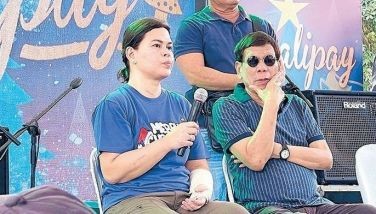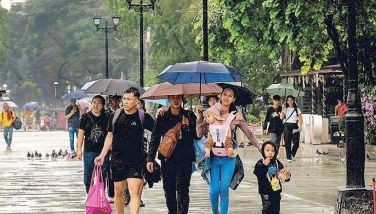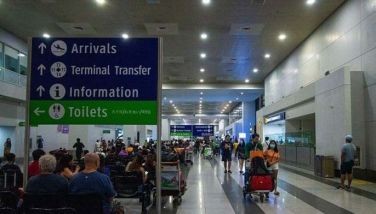'Doy' seeks full court hearing on Expo
April 26, 2002 | 12:00am
It’s not over yet.
Former Vice President Salvador "Doy" Laurel said yesterday he will appeal to the entire Supreme Court a ruling by an SC division that cleared the way for his indictment on graft charges in connection with the P9.6-billion Centennial Expo scam in 1998.
"The legal fight is far from over," Laurel said. "I’m preparing to elevate the case from the first division to the en banc because this involves a constitutional question."
Last Wednesday, the SC’s first division – with the exception of Chief Justice Hilario Davide Jr. who inhibited himself from the case – rejected Laurel’s argument that he could not be held liable because he was not a public official.
Laurel had contended that he could not be held liable since he was not a government official, having received no salary as chairman of the National Centennial Commission and chief executive officer of Expocorp., the contractor given the task of finishing the Expo project in Pampanga.
However, Justices Santiago Kapunan, Reynato Puno and Consuelo Ynares-Santiago said the NCC was a public office because it clearly performed sovereign and executive functions being created by then President Fidel Ramos.
As for Laurel’s argument, the three justices said the issue was "best resolved at a trial."
If that was the case, "why did the Supreme Court itself name two of its members to the Centennial Commission," Laurel wondered, referring to then associate justices Flerida Ruth Romero and Camilo Quiason, both retired.
"In doing so, did not the Supreme Court point the accusing finger to itself because the Constitution prohibits the Court from designating any member to any other government agency?" Laurel argued in a statement.
"Was I the only member of the NCC that became a public officer? What about the rest of the more than 40 other NCC commissioners who represented the private sector, the women sector, the youth sector, the ethnic groups, including members of the media – did they all also become public officers?"
Laurel also pointed out that the Senate and the House of Representatives both had representatives in the NCC. If the SC ruling were followed, he said, this was a violation of a constitutional prohibition against members of Congress holding any other government office.
He also said he was being singled out. "If there is no case against all the other co-respondents, with whom could I have conspired?" Among those cleared earlier were former President Ramos, former Expocorp president Teodoro Peña and Asiakonstrukt president Edgardo Angeles.
In handing down its decision against him, Laurel said the SC’s first division "suddenly refused to follow its own ruling" made on a similar case last Feb. 6.
"In that recent case, the First Division ruled that a corporation which was not created through an act of Congress is a private corporation and consequently beyond the jurisdiction of the Ombudsman," Laurel contended.
In November 2000, Ombudsman Aniano Desierto recommended the filing of graft charges against Laurel after graft probers found out that he awarded the Centennial Expo’s Freedom Ring project to Asia Construction Development Authority without a public bidding.
A year later, however, Laurel obtained from the Supreme Court an order stopping Desierto from filing criminal charges.
In their report, the graft probers also said Laurel "prematurely" issued a notice to proceed with the construction of the amphitheater in December 1996, four months before the contract was signed.
Former Vice President Salvador "Doy" Laurel said yesterday he will appeal to the entire Supreme Court a ruling by an SC division that cleared the way for his indictment on graft charges in connection with the P9.6-billion Centennial Expo scam in 1998.
"The legal fight is far from over," Laurel said. "I’m preparing to elevate the case from the first division to the en banc because this involves a constitutional question."
Last Wednesday, the SC’s first division – with the exception of Chief Justice Hilario Davide Jr. who inhibited himself from the case – rejected Laurel’s argument that he could not be held liable because he was not a public official.
Laurel had contended that he could not be held liable since he was not a government official, having received no salary as chairman of the National Centennial Commission and chief executive officer of Expocorp., the contractor given the task of finishing the Expo project in Pampanga.
However, Justices Santiago Kapunan, Reynato Puno and Consuelo Ynares-Santiago said the NCC was a public office because it clearly performed sovereign and executive functions being created by then President Fidel Ramos.
As for Laurel’s argument, the three justices said the issue was "best resolved at a trial."
If that was the case, "why did the Supreme Court itself name two of its members to the Centennial Commission," Laurel wondered, referring to then associate justices Flerida Ruth Romero and Camilo Quiason, both retired.
"In doing so, did not the Supreme Court point the accusing finger to itself because the Constitution prohibits the Court from designating any member to any other government agency?" Laurel argued in a statement.
"Was I the only member of the NCC that became a public officer? What about the rest of the more than 40 other NCC commissioners who represented the private sector, the women sector, the youth sector, the ethnic groups, including members of the media – did they all also become public officers?"
Laurel also pointed out that the Senate and the House of Representatives both had representatives in the NCC. If the SC ruling were followed, he said, this was a violation of a constitutional prohibition against members of Congress holding any other government office.
He also said he was being singled out. "If there is no case against all the other co-respondents, with whom could I have conspired?" Among those cleared earlier were former President Ramos, former Expocorp president Teodoro Peña and Asiakonstrukt president Edgardo Angeles.
In handing down its decision against him, Laurel said the SC’s first division "suddenly refused to follow its own ruling" made on a similar case last Feb. 6.
"In that recent case, the First Division ruled that a corporation which was not created through an act of Congress is a private corporation and consequently beyond the jurisdiction of the Ombudsman," Laurel contended.
In November 2000, Ombudsman Aniano Desierto recommended the filing of graft charges against Laurel after graft probers found out that he awarded the Centennial Expo’s Freedom Ring project to Asia Construction Development Authority without a public bidding.
A year later, however, Laurel obtained from the Supreme Court an order stopping Desierto from filing criminal charges.
In their report, the graft probers also said Laurel "prematurely" issued a notice to proceed with the construction of the amphitheater in December 1996, four months before the contract was signed.
BrandSpace Articles
<
>
- Latest
- Trending
Trending
Latest
Trending
Latest
Recommended






























